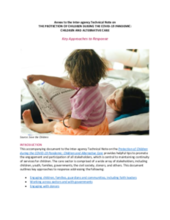Demographic Data:
|
Sources: World Bank, UNDP, DHS 2010-11 |
Displaying 4331 - 4340 of 14391
This report presents a review of published literature and consultation with current foster and kinship carers to examine impacts of COVID-19 on OOHC, highlighting the likelihood of increased service strain.
This webinar addresses the risk factors of the current crisis on youth and families, the challenges that professionals like therapists, psychologists, and social workers are facing; and tips and strategies to manage the emotional impact of COVID-19 on youth, families, and professionals using telemedicine and other novel techniques.
This study explored the effects of the factors on independent living readiness among youth under out‐of‐home care. Specifically, this study focused on the effects of caregivers' autonomy support and psychological capital on independent living readiness through personal growth initiative.
This article provides a conceptual depiction of how schools and treatment foster parents partnerships can be formed and maintained.
This study examined the relation between neighborhood disorder and children’s internalizing and externalizing problems among children in kinship care and tested caregivers’ social support as a potential mediator.
El segundo webinar organizado por RELAF en el contexto de la pandemia causada por el COVID-19 tuvo como objetivo proveer herramientas sobre el apoyo y contención; los contactos con sus familias y amigos; el manejo de la información; las estrategias terapéuticas tanto para niños y niñas en residencias, como en familias de acogida y en procesos de vinculación pre adoptiva.
This report outlines key human rights risks to children related to the COVID-19 crisis, and steps that governments should take to protect children’s rights in the pandemic, mitigate its devastating effects, and benefit children after the crisis is over.
This accompanying document to the Inter-agency Technical Note on the Protection of Children during the COVID-19 Pandemic: Children and Alternative Care provides helpful tips to promote the engagement and participation of all stakeholders, which is central to maintaining continuity of services for children.
The aim of this Technical Note is to support child protection practitioners and government officials in their immediate response to the child protection concerns faced by children who are at risk of separation or in alternative care during the COVID-19 pandemic.
Join this webinar on Thursday, April 9, 2020 from 3:00-4:00 pm EDT, to learn about "Flourishing Families," an activity-based curriculum for family-serving professionals.



